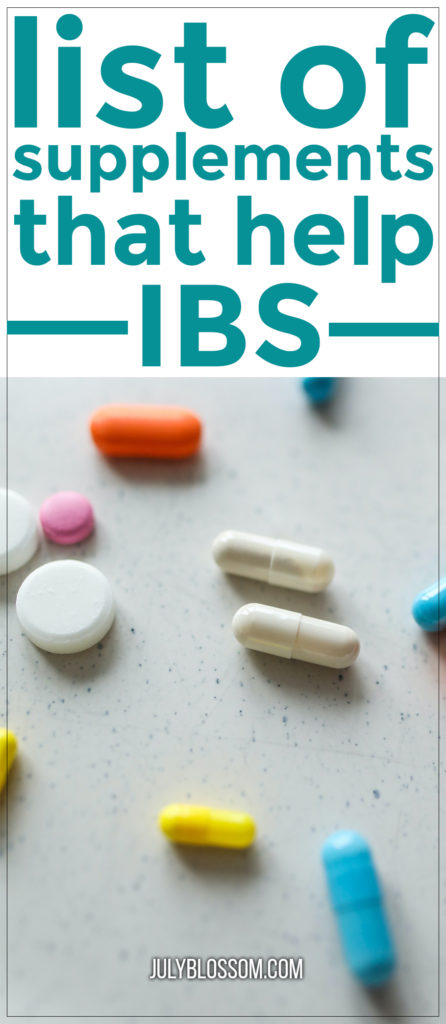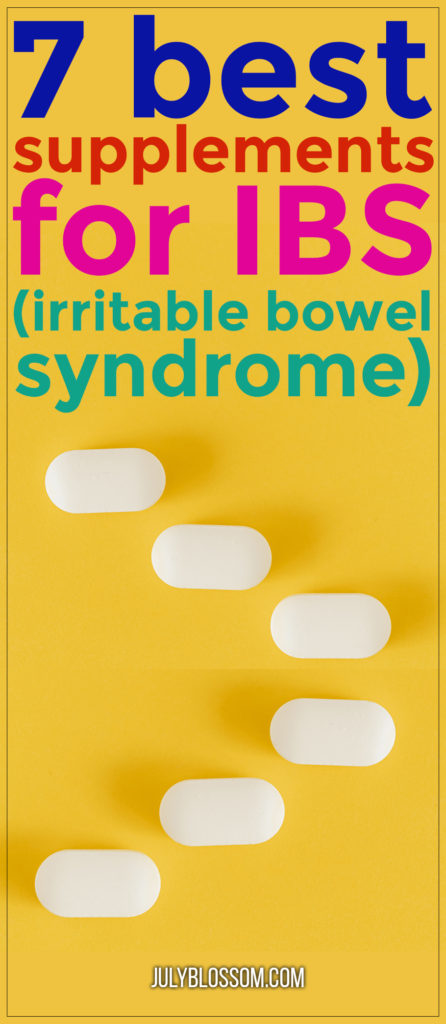How are you coping with IBS? I hope you know that you can try supplements for relief in addition to other routine changes and remedies you are implementing. The right kind of supplement(s) can keep a whole lot of discomfort away. In this article, I’ll list down what I have seen may be the best supplements for IBS.
Three Main Types of IBS
Now before we get into the gist of the best IBS supplements for you, here’s a little info on the types of IBS. Yes, not everyone has the same type.
There are the 3 dominant IBS types: IBS-C which is Constipation dominant IBS, IBS-D which means Diarrhea dominant IBS and IBS-M which stands for Mixed IBS with both constipation and diarrhea.
Before we start gauging which supplements can work for you, you should know what symptoms affect you the most.
List of 7 Best Supplements for IBS

1. Digestive Enzymes
Digestive enzymes are natural substances that help your body digest food.
Most digestive enzymes are made by the pancreas and these include the three major ones: amylase which breaks down carbohydrates, lipase for dietary fats and protease which digests protein.
You will benefit from digestive enzyme supplementation if you experience bloating, gas, abdominal pain, bad smelling bowel movements and SIBO.
Supplementing with pancreatic enzymes provides general macronutrient support.
If you have trouble digesting particular food groups, then try supplementing with specific digestive enzymes.
For example, lactase (which is produced in the small intestine), helps digest dairy while alpha galactosidase is good for digesting legumes like beans.
Gluten products like wheat can be better digested with phytase which helps break down the phytic acid that irritates the digestive system in some people.
2. Berberine
Do you know that recent studies suggest that bacterial overgrowth may be one of the probable causes of IBS?
To kickstart healing of the gut to eliminate toxins and harmful microbes, you can take a berberine supplement. This natural substance provides microbiome support for those of us with IBS and SIBO.
Furthermore, berberine is helpful for mitigating IBS symptoms such as heartburn, stomach irritation, constipation and diarrhea. This makes it is helpful for all types of IBS.
It is not necessary to undertake in long term supplementation of berberine because it not only corrects bad bacteria overgrowth but may also destroy good bacteria in the gut.
Not to worry though, probiotic supplementation can help balance the gut environment if the good bacteria there have been disrupted.
3. Partially Hydrolyzed Guar Gum
Many of us know guar gum as a thickener in food processing. But lo and behold, partially hydrolyzed guar gum has been found to be a useful treatment for IBS.
Guar gum is a water-soluble polysaccharide obtained from the seeds of a plant called guar, which is native to India and Pakistan.
Since guar gum is extremely thick and viscous to be used in food in large quantities, partially hydrolyzed guar gum (PHGG) is used for its treatment properties. It is found to have a positive effect in the treatment of acute diarrhea in children and adult patients in ICUs.
It has a profound effect on IBS-Constipation in particular as it is effective in softening and improving bowel movements
It is also a prebiotic fiber, which means it stimulates the growth and helps repopulate good bacteria in the colon which improves IBS patient health.
Studies like this one and this one show that partially hydrolyzed guar gum relieves symptoms in IBS-C patients and those with the IBS symptom of bloating.
4. Probiotic Supplements
Probiotics are among the helpful supplements for IBS, whether you have IBS-D, IBS-C or IBS-M.
Taking a broad-spectrum probiotic supplement helps regulate an irritated gut, prevent digestive issues and improve gut environment that has been ravaged by antibiotic treatment.
Many studies carried out recently, such as this one, have shown that probiotics are useful in the treatment of IBS.
IBS related issues such as gut motility, inflammation and small bowel bacterial overgrowth can be soothed by regularly taking probiotics.
A probiotic supplement ensures you get the right dose of natural good bacteria delivered straight to gut.
5. Psyllium Supplements
If you’re looking for a fiber supplement for IBS, psyllium may be your best bet. It is a soluble fiber that comes with nice effects such as low gas production, reduced bloating, little to no abdominal pain, and no other symptoms caused by too much gas.
Make sure to consume plenty of water with the supplement for best results. Also, since too much fiber can hinder the absorption of medication, take your medicine one to two hours before the psyllium supplement.
Keep in mind too much fiber may make abdominal cramping, gas and bloating issues worse so do not pair your fiber supplement with a lot of fiber-filled foods.
6. Magnesium
Magnesium is another great and safe IBS supplement. It mainly helps relax the muscles of the gastrointestinal system.
Supplementing with magnesium also increases water in the intestines which enables digested material to move smoothly through the digestive tract.
Magnesium citrate relaxes the large intestines and the bowels, which aids in relieving slow, sluggish and painful bowel movements. In other words, magnesium is a wonderful supplement for IBS-Constipation!
You may also try magnesium oxide, which can easily be found in the pharmacy as well. It is good for treating indigestion as well as bringing relief from constipation.
7. Peppermint Oil
Last but not least on this list of supplements for IBS is peppermint oil capsules.
For many, peppermint oil is a heaven-sent remedy when applied topically to soothe IBS abdominal pain, bloating and gas.
However, it can also be taken internally in form of enteric-coated capsules. These capsules contain about 181 milligrams of peppermint oil. Make sure it is enteric coated to reduce the possibility of you getting heartburn from swallowing them.
Why peppermint oil? Well, it is known for its ability to help reduce muscle spasms which works in relaxing the smooth muscles of the gastrointestinal tract. Furthermore, just like it helps soothe abdominal pain when rubbed on the belly, it also helps some individuals reduce it from the inside with its analgesic and anti-inflammatory properties.
As peppermint oil is very concentrated and is rarely used internally, please take it after the advice of a well-trained and knowledgeable doctor. The dose for adults can be 1 to 2 capsules taken three times daily.
Anecdotal evidence shows that people find peppermint oil supplementation effective for IBS. However, if you find it too overwhelming for your sensitive stomach, please go ahead and try peppermint tea instead!

It’s not easy trying to find out which foods and supplements suit you when you have IBS. It can become overwhelming, oftentimes. However, taking the effort to investigate your diet and supplements plus other lifestyle changes is so worth it. Don’t give up! It IS possible to get IBS in control.








Leave a Reply